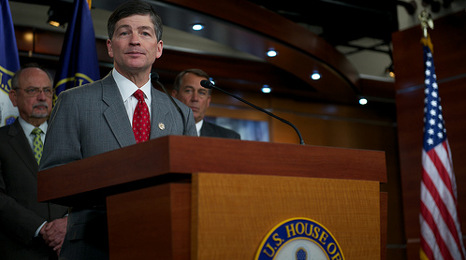House Members Want More Access to CFPB Meetings

U.S. House Financial Services Committee chairman Rep. Jeb Hensarling is calling on Consumer Financial Protection Bureau director Richard Cordray to end the bureau’s closed-door meeting policy for its four advisory councils. Photo courtesy of House GOP.
By subscribing, you agree to receive communications from Auto Remarketing and our partners in accordance with our Privacy Policy. We may share your information with select partners and sponsors who may contact you about their products and services. You may unsubscribe at any time.
WASHINGTON, D.C. –
To mark “Sunshine Week,” a national initiative launched by the media to promote open government, U.S. House Financial Services Committee chairman Rep. Jeb Hensarling is calling on Consumer Financial Protection Bureau director Richard Cordray to end the bureau’s closed-door meeting policy for its four advisory councils.
Hensarling, a Texas Republican, said earlier this week, “Instead of operating behind closed doors, it’s time for the CFPB to live up to its oft-stated commitment to transparency and openness.
“In the interest of true, genuine transparency and open government, director Cordray can and should use ‘Sunshine Week’ to take immediate steps that bring the CFPB into the sunlight,” Hensarling continued.
The committee chairman pointed out the Bipartisan Policy Center also criticized the CFPB for closing its advisory group meetings to the public.
The CFPB claims on its website that “Transparency is at the core of our agenda …You deserve to know what we’re doing for the American public and how we are doing it.”
However, Hensarling noted four advisory groups created by the CFPB conduct “virtually” all of their business behind closed doors — refusing requests by members of the public and even a member of Congress to attend them.
Subscribe to Auto Remarketing to stay informed and stay ahead.
By subscribing, you agree to receive communications from Auto Remarketing and our partners in accordance with our Privacy Policy. We may share your information with select partners and sponsors who may contact you about their products and services. You may unsubscribe at any time.
The meetings are also closed to the press.
For example, Hensarling mentioned the agenda for the CFPB’s Consumer Advisory Board’s last meeting shows only two hours out of two days’ worth of meetings were open to the public.
Rep. Sean Duffy, a Wisconsin Republican and a member of the Financial Services Committee, requested to attend the Consumer Advisory Board’s February meeting. The CFPB’s advisory groups — which include the Community Bank Advisory Council, the Credit Union Advisory Council, and the Academic Research Council in addition to the Consumer Advisory Board — are made up of industry representatives, consumer activists and academics.
“What goes on at these meetings? If the CFPB is as committed to transparency as it claims,” Duffy said, “then why was I denied entry when I asked to attend?”
Duffy and Hensarling recounted that Cordray has said the meetings are closed to the public because the Federal Advisory Committee Act, a sunshine law passed in 1972, does not apply to the bureau.
Yet, by law, the congressmen said, all federal agencies are subject to the act with the exception of the Central Intelligence Agency, the Director of National Intelligence, and the Federal Reserve’s Federal Open Market Committee.
“The CFPB is an independent agency housed within the Federal Reserve, but the Fed exercises no control over the CFPB or its advisory groups,” the lawmakers said.
Yet another Republican lawmaker, Rep. Robert Pittenger of North Carolina, insisted the Dodd-Frank Act that created the CFPB also does not exempt the bureau from the federal sunshine law.
In fact, Pittenger contends nothing prevents the CFPB director from opening the meetings up to the public.
Pittenger asked Cordray at a January hearing “Why deny the public the right to observe these meetings?”
During the session, Cordray replied that the advisory group meetings are closed to the public so “we can speak candidly about matters that are not yet public that the bureau is working on, including things like enforcement actions and the like.”
In a Feb. 4 letter to Cordray, Hensarling described that response as “deeply troubling.”
Hensarling went on to tell Cordray, “Confidential information related to pending investigations or enforcement actions is potentially market moving and could be used for financial gain. Consequently, I am concerned that the bureau would release confidential information to persons who do not work for the bureau and could be competitors or future legal adversaries of the party subject to the enforcement action.”
Hensarling said Cordray has yet to respond to his earlier letter.
In addition to closing the meetings to the public, Hensarling believes the CFPB instructs its employees to keep details about agency events on their work calendars to a minimum in order to shield information about their activities from the press and public.


